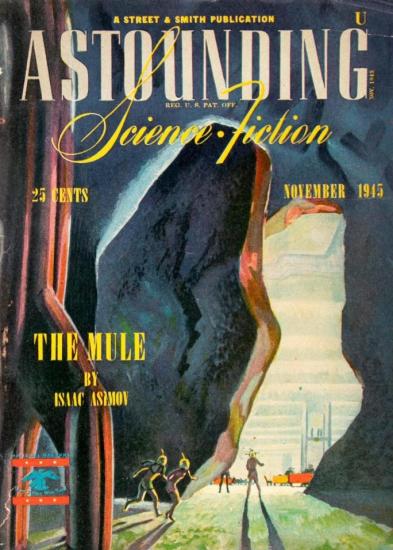
Rating: Not rated
Tags: Science Fiction, Hugo Award, Lang:en
Summary
Isaac Asimov's Foundation series appeared in Astounding
Science Fiction intermittently from 1942 through 1950, and
for long years has been a favorite of fans. It describes a
multi-century vision, worked out with Astounding's editor
John W. Campbell, of a Galactic Empire in decline and fall,
followed by a chaotic Interregnum which may lead eventually
to a new and better Empire. The statistical / sociological
science of Psychohistory is the means by which the chaos and
wars may be shortened by many millennia. Psychohistory is a
predictive science, Hari Seldon's master plan for humanity,
giving useful information only at the heights of mathematical
abstraction over major populations. Eventually, after the
Interregnum, all will march into the socio-mathematically
managed Utopia. The Foundation stories are dry and talky, very thin of
action taking place onstage. Asimov's own acknowledgement of
this was clear when he was prevailed upon, many years later,
to write additional Foundation novels and he wanted to write
to a similar plain style; and in fact those latter books are
not only as dry but virtually action-free. But — enter the Mule "The Mule" is different. This novella is Asimov's own
favorite of the original stories, and deservedly so. Its
striking title character is Asimov's most memorable ever, and
is vividly and sensitively portrayed. The Mule, as he calls
himself, is a human mutant: a telepath and telempath able to
share and manage both thoughts and emotions. The Mule is effectively a superman, and he stands out the
more because the billions of people in the galaxy are
statistical sheep, units in the vast sweep of
Psychohistorical analysis. This makes plotting the Foundation
series rather challenging; if your side is going to win or
lose each conflict as predicted by Psychohistory, then why
worry about intelligence, initiative, or bravery?
Psychohistory depends upon the sheep staying unaware of their
secret sociomath-kings. Once the citizens see the inexorable
predetermination of their history, why bother to continue? In
fact, once the readers of Astounding see the inexorable
pattern of the Foundation series, why keep reading? —
Hence, "The Mule".
1946 Retro Hugo Award